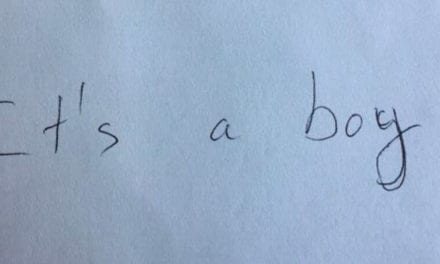The wind in the trees outside was making shadows dance against the powder blue pull-down shades. Mottled light played over unfolded clothes spilling from the plastic basket on the floor, across the green shag carpeting, up a gold-flecked french provincial-style dresser, and off a silver tray that cradled a matching mirror and hairbrush.
The room was hot, heavy, and still. I sat gingerly on the edge of my grandmother’s bed, unsure of what to do. She lay on her side next to me, breathing audibly, staring straight ahead. I tentatively put my hand on her arm. “I hope you feel better soon, Grandma,” I finally told her, smiling, as I got up to go.
In the kitchen, my aunt wore a crease of worry across her forehead. Grandma had been feeling dizzy and complaining of an earache, she said, so she was going to take her to the clinic that afternoon. But she was going to be just fine, she said. And I agreed.
I made a mental note to mail a get well card once I got back, and said my goodbyes. I’d been up north visiting family over the 4th of July holiday, and it was time to head back to school.
***
One a week later, grandma had a stroke. My dad got on the next flight from Virginia, and he called me with updates from her bedside. It was a mild one, he told me, and the doctors thought she’d make a full recovery. I even joked with her briefly on the phone. I thought about driving up to see her, because it would make her happy. She was laid up in a hospital in Saginaw, which was about a two hours away. It wouldn’t be that bad, I thought. I could fit a quick trip in. But I had papers due in my summer classes, and work too.
I didn’t get around to it.
***
A little over a week after that, she had another stroke. My dad got on another plane to go another hospital, but this time it wasn’t so good. This time it was much worse. She had opened her eyes, but she hadn’t spoken yet. She was in stable condition, but the doctors wouldn’t give a real prognosis. Nobody knew what was going to happen. After spending a day with her, my dad and his sister decided to head back to the family farm to freshen up and check in on their father.
In between phone calls I wrung my hands, paced, and packed a bag to leave the next morning. When I arrived at the farm, the get well soon card I had sent weeks earlier was still lying open on the kitchen table. We went into town to get some lunch, and by the time we got back there was a brand new message on the answering machine from the nurse. Hurry, she said. Come soon. She’s taken a turn for the worse.
We listened to the message twice in disbelief, and after the second time my aunt crumpled over as if she’d been punched in the gut. My grandfather, the strange, stubborn man that he is, flatly refused to go to any hospital and instead retreated outside to the shed. My dad, his face drawn tight, decided he should stay behind to watch him. That left me to drive.
It was 1.5 hours to Bay City Medical. In Caseville we passed the tiny theater where my grandma, my aunt, and I had just seen a movie over the holiday.
My aunt sobbed the whole way.
Her room was just like the hospitals I’d seen on TV. Beeping monitor, whooshing breathing apparatus. It was exactly like TV, except it wasn’t at all, because it was my own grandmother in that hospital bed.
Her eyes were closed. My aunt and I held her hands, rubbed her arms, and talked to her. Just the two of us, under a fluorescent light. I tried to think of jokes to tell her, and of memories to share. I tried to think of a way to comfort my aunt, who sometimes cried so hard her whole body shook.
In between, I used a pay phone to call my boss and explain why I wouldn’t be able to make it to work the next day. I sat in the cafeteria, sipped hot chocolate from a styrofoam cup, and stared at an empty space on an orange wall. I stood outside in the parking lot and watched the light fade from the sky.
Grandma’s sister Jean, whom she had raised when their mother died of cancer, had called my aunt to say she was trying to make it to the hospital that night from Warren. As grandma faded, we clung to that bit of information to help keep her — and us — going. Jean’s coming, we repeated. Jean might be here any minute now!
Jean never came.
My grandmother never opened her eyes.
It was close to midnight when the priest arrived to administer the last rites.
I blinked awake in confusion when a nurse, silhouetted against the door, came to tell us it was almost time. I pushed a rough wool blanket off of me and struggled to get up from a chair. Back in her room, her ragged breaths were shallow and too far between. Her vitals were flat blips on a black monitor. I reached out and touched her hand one last time. It was cold.
She was already gone.
Outside, the sunrise felt like a shock of cold water in the face. I drove, again, while my aunt snuffled in the passenger seat.
***
Back at the farm, I eased the car down the drive and cut the engine. I walked to the edge of the field, head hollow and heart leaden. The screen door of the house squeaked as my dad came out to meet me. Above us, cirrus clouds were splayed in fingered waves across the sky, their edges seared with pink and gold from the early sun.
I’ve never been prone to hackneyed sentimentality, but that morning I looked up and said, “Grandma painted that sky.” And my father gathered me into a hug, hung his head over my shoulder, and let out a sob.
It was the first time I’d ever seen him cry.
It was seven in the morning on Monday, July 23rd, 2001.





Beautifully written, and heartbreaking.
So sorry. Thinking of you and your family, and hoping today isn’t too hard for you all.
I’m sorry about your grandmother. Those days of grief never leave us.
So beautiful, incredibly written. Big hugs, love.
Oi. I should have known from the title, but I went ahead and read anyway. This is a beautiful memorial to your grandmother. Whether you are being funny or sad, you have such a way with words.
Oh Lyn, I’m sorry. You have written it so beautifully.
Lyn…this is beautiful and sad and heartbreaking and wow…what a beautiful piece to write for your grandma.
That was a beautiful passage. Having recently lost my grandparents, I totally sympathize about how hard that must have been for you. Hope you were at peace on Saturday.
I’m so sorry – we lost my grandma last week, in a very similar way. i think seeing your father cry is one of the hardest things in the world. sending positive thoughts to you & your family.
I am so, so sorry for your loss.
beautiful piece. i don’t think i could ever write about a family death like this. thanks for sharing, and digital hugs to you.
This is beautifully written. Lots of big hugs.
“Grandma painted that sky.”
Lyn, so wonderfully written. This will stick with me.